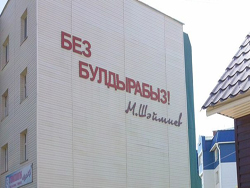
Battered by war, sanctions Baltic countries are looking for entry into the Russian market, bypassing Moscow. Lithuanian and Latvian politicians try to speak with the subjects of the Russian Federation directly, offering to mediate for export to the EU. Economics – separately, the policy – separately, explain the Baltic States the necessity of cooperation. In vain. The Kremlin is quite clearly outlined its strategy towards the Baltic countries: unfriendly regimes will no longer receive lifeline from Russia. To follow this strategy needs and regions.
Russia remains the main export partner of Lithuania. The Ukrainian crisis, sanctions war, NATO maneuvers, the anti-Russian hysteria official Vilnius – foreign voltage, without doubt, weakened the economic and trade relations between the two countries. But it turned out that in other areas of the Lithuanian exports sagged even more. “I said that in 2016 Russia will not be the main trading partner of Lithuania, but it is still wrong. It happened because the decreased export to other markets. Exports decreased in many markets because of reduced export prices for oil products, food products, cheaper fertilizer, and the situation in which the decline of exports to Russia was not as big as other markets,” – said economist of SEB Bank, Gitanas Nausea.
Last year, a decline of Lithuanian exports amounted to 5.7%. The results of this year SEB Bank expects a decline of 2%. It is possible that these predictions still have time to adjust downward. In the middle of the year, the same economists SEB optimistically predicted Lithuanian export growth of 2.4%.
Most of the products coming from Lithuania to Russia, re – export which is not subject to sanctions.
The decline in sales of “non-democratic” neighbors of its own products miraculously did not cause the “Putin regime” tangible harm, but the Lithuanian economy was badly shaken. In July, Prime Minister Algirdas Butkevicius told that the European Commission and personally its Chairman Jean-Claude Juncker has recognized the Baltic Republic most affected by the war of sanctions among all 27 EU countries.
For a long time, Lithuanian officials tried to convince the public and manufacturers that lobbied Vilnius official anti-Russian action will not affect the economy. The realization that the truth in such speeches – not broken cents, it’s fast enough. Don’t worry, we’ll find you new markets, reassuring the Baltic policy of their peasants gingerbread-sweet fairy tales, but the Lithuanian skilandis somehow never appeared on the shelves of Chinese and Chilean stores. It turned out that the Baltic agricultural products were valued only in Russia.
Farmers and businessmen in other industries, faced with the threat of bankruptcy, put pressure on the powers that be.
The most uncompromising supporters of the introduction and continuous tightening of anti-Russian sanctions are starting to look for loopholes and vents on the market of the big neighbor. Lithuanian diplomats are trying to strengthen business cooperation with regions of Russia to bypass Moscow. So, Vilnius offers the Nizhny Novgorod region Governor Valery Shantsev to become a mediator for export to the EU. “We can be mediators for the Nizhny Novgorod products in Europe because our companies have the necessary certificates and contracts. So, “KAMAZ” is going in Lithuania and sold in the EU. We talked about this with leaders of the “GAS” they were intrigued that perhaps some details could also make us” – was in advertising at the meeting with entrenching the Lithuanian Ambassador to Russia Remigijus Motuzas. Such services Motuzas offered during a conversation with the mayor of Nizhny Novgorod by Ivan Carolinum. “When considering relations between States, first of all should be paid attention to economic Affairs, because the economy starts whole social life. The Republic of Lithuania now ranks 27th among all countries–partners of the Nizhny Novgorod region in the economic sphere is a good result,” – said Motuzas.
In the Russian regions has an eye not only Lithuanians, but also their neighbours-Latvians. The Ministry of economy of Latvia extended an invitation to President of Tatarstan Rustam Minnikhanov. In early October Minnikhanov with delegation of businessmen arrived in Riga. Tatar guest discussed with Latvian Prime Minister questions in the field of transport and logistics, with the mayor of Riga – partnership opportunities in the field of ports and transportation, have agreed to strengthen cooperation in the fields of entrepreneurship, tourism and culture with the President. However, great results from the visit of the President of the Latvian side is not worth waiting. Visit of Tatarstan President wore a “reconnaissance” nature.
Diplomatic Protocol of intentions is one thing, live trading contracts is somewhat different.
The Baltic States are frightened of the withdrawal of Russian transit and weakened food-sanctions war, decide to get out of the dusty cupboard an old shaggy, the idea of a “bridge between Russia and the West.” To sell this idea to policy of the Baltic States trying to separate subjects of the Russian Federation directly. Own the hawks and the Russian regional elites the need for such commercial cooperation of the Baltic States to explain the hypocritical formula, “Economics – separately, the policy – separately.” And now Pro-governmental Latvian newspaper Latvijas Avize, commenting on the visit to Riga Minnikhanov, Tatarstan calls as if not quite Russia. “It (the Tatarstan – approx. RuBaltic.Ru) image not directly associated with the aggressive foreign policy of the Kremlin” – the newspaper writes, with an emphasis on broad autonomy of the Republic.
That’s just trying to build relations with Russian constituent entities to bypass Moscow policy of the Baltic States miscalculated. Relations with Russia – not a record, you can rewind, warned though. There is a political flirt, and have a strategy. Putting before largest carriers the task until 2020 to get all Russian cargoes from ports of Baltic States, the Kremlin this strategy clearly specified unfriendly Baltic regimes will no longer receive from Russia a lifeline.








